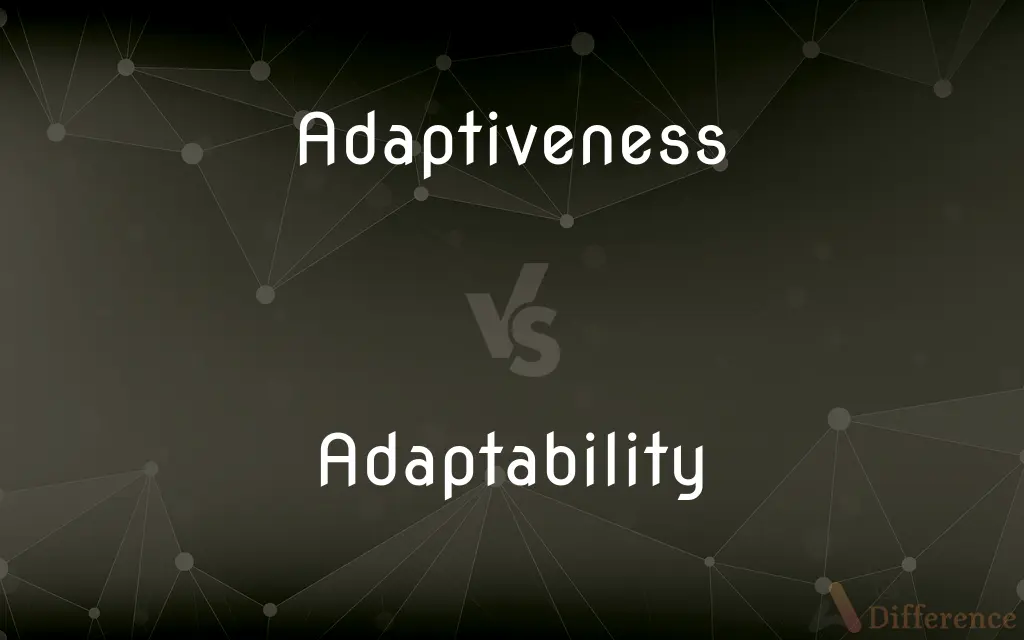Adaptiveness vs. Adaptability — What's the Difference?
By Tayyaba Rehman & Maham Liaqat — Updated on April 6, 2024
Adaptiveness emphasizes the process or trait of changing effectively in response to environments, while adaptability refers to the capacity to adjust to various conditions.

Difference Between Adaptiveness and Adaptability
Table of Contents
ADVERTISEMENT
Key Differences
Adaptiveness highlights the active process of changing or being modified to fit new conditions or environments. It often implies a dynamic or ongoing adjustment in response to direct stimuli. For example, organisms demonstrate adaptiveness through evolution, showing changes over generations to better survive in their habitats. Whereas adaptability focuses on the potential or ability to adjust to different situations, environments, or conditions. It is more about the capability or potential that individuals, systems, or organizations have to make adjustments. This characteristic is essential for personal development, business strategies, and technological innovations, suggesting a readiness or preparedness to change as needed.
Adaptiveness can be seen in the context of immediate responses or changes. It often involves a direct and observable reaction to external pressures, such as animals adapting their behaviors to avoid predators. On the other hand, adaptability might not always result in immediate observable changes but instead indicates the underlying ability to do so when necessary. It’s like having a versatile skill set that allows a person to switch careers smoothly.
In adaptiveness, the emphasis is often on the evolutionary or developmental process that enables organisms or systems to become better suited to their environment. This process is continuous and can lead to significant transformations over time. Whereas adaptability, by contrast, may refer to a more static trait or quality that does not imply an ongoing process but rather a state of being ready to adapt when circumstances demand it.
Adaptiveness can also suggest a measure of how effectively an entity has responded to changes in its environment. It's a way to evaluate the success of adaptations. For instance, in technology, a system's adaptiveness might be measured by how well it integrates new updates or responds to security threats. Conversely, adaptability is often considered a prerequisite for innovation and growth, highlighting the potential to embrace new ideas or methodologies without indicating the outcome of such adaptions.
While adaptiveness is about the actual changes that have taken place, adaptability is more about the scope or range of potential changes that can be accommodated. In human psychology, adaptiveness may refer to how individuals have adjusted their behavior or thinking in response to life events, whereas adaptability is about the general ability to cope with and adapt to new situations, irrespective of whether they have occurred yet or not.
ADVERTISEMENT
Comparison Chart
Definition
The process or trait of changing effectively in response to environments.
The capacity to adjust to various conditions.
Focus
On active changes and modifications.
On the potential or ability to adjust.
Context
Often associated with evolutionary or immediate responses.
Related to a broader capacity, including preparedness for future changes.
Observable Outcomes
Changes are direct and observable.
Potential changes, not always immediately observable.
Emphasis
On the effectiveness of adaptations.
On the capability or readiness to adapt, regardless of current necessity.
Compare with Definitions
Adaptiveness
The quality of being able to adjust effectively to new or changing environments.
The adaptiveness of certain invasive species allows them to thrive in diverse ecosystems.
Adaptability
In ecology, it pertains to the potential range of habitats an organism can occupy.
The adaptability of certain plants makes them suitable for various climates.
Adaptiveness
In personal development, it refers to the process of learning new skills in response to life's changes.
An individual's adaptiveness is tested when they relocate to a new country with a different culture.
Adaptability
The ability to adjust oneself readily to different conditions.
Adaptability is a valued trait in the rapidly changing tech industry.
Adaptiveness
In technology, refers to systems that evolve to meet changing user needs or environmental conditions.
The adaptiveness of a software platform can be seen in its regular updates and feature additions.
Adaptability
In education, it relates to learning and applying knowledge in diverse situations.
Students' adaptability is tested through assignments in unfamiliar contexts.
Adaptiveness
In business, it's the ability to change strategies or operations in response to market dynamics.
A company's adaptiveness to consumer trends is crucial for its long-term success.
Adaptability
Refers to the potential within individuals or systems to adjust without prior change.
Her adaptability was evident when she quickly learned the new software.
Adaptiveness
Demonstrates an organism's or system's evolution over time to better fit its surroundings.
The adaptiveness of birds to urban environments is evident in their modified nesting behaviors.
Adaptability
In organizational contexts, it's the capacity for innovative responses to challenges.
The company's adaptability has kept it ahead of technological advancements.
Adaptiveness
Relating to or exhibiting adaptation.
Adaptability
Adaptability (Latin: adaptō "fit to, adjust") is a feature of a system or of a process. This word has been put to use as a specialised term in different disciplines and in business operations.
Adaptiveness
Readily capable of adapting or of being adapted
An adaptive worker.
Adaptive clothing for children with special needs.
Adaptability
Capable of adapting or of being adapted.
Adaptiveness
The state or quality of being adaptive; capacity to adapt.
Adaptability
The quality of being adaptable; a quality that renders adaptable.
Adaptiveness
The quality of being adaptive; capacity to adapt.
Adaptability
(biology) Variability in respect to, or under the influence of, external conditions; susceptibility of an organism to that variation whereby it becomes suited to or fitted for its conditions of environment; the capacity of an organism to be modified by circumstances.
Adaptability
The quality of being adaptable; suitableness.
Adaptability
The ability to change or be changed to fit changed circumstances
Common Curiosities
What does adaptability mean?
Adaptability refers to the ability or capacity to adjust to different conditions or environments.
Can adaptiveness be measured?
Yes, adaptiveness can be measured by evaluating how effectively an entity responds to environmental changes.
What is adaptiveness?
Adaptiveness is the quality or process of changing effectively in response to new or changing environments.
How do adaptiveness and adaptability differ in application?
Adaptiveness often applies to the actual process of changing, while adaptability refers to the potential to make such changes.
Is adaptability a fixed trait?
No, adaptability is not fixed; it can be developed or enhanced through experiences and learning.
Why is adaptability important in the workplace?
Adaptability is crucial in the workplace for dealing with change, solving problems creatively, and embracing new opportunities.
How does adaptiveness affect survival?
Adaptiveness directly influences an organism's or entity's ability to survive and thrive in changing environments.
How does technology demonstrate adaptiveness?
Technology demonstrates adaptiveness through updates and innovations that meet evolving user needs or conditions.
How can organizations improve their adaptiveness?
Organizations can improve adaptiveness by fostering a culture of innovation, flexibility, and continuous learning.
Do adaptiveness and adaptability only apply to biological organisms?
No, these concepts also apply to organizations, technologies, and individuals in various contexts.
Is adaptability more important than expertise in a rapidly changing field?
While expertise is valuable, adaptability is increasingly important in rapidly changing fields for staying relevant.
Can a person be naturally adaptable?
Yes, some individuals may naturally possess a higher degree of adaptability, though it can also be cultivated.
Does adaptability affect personal growth?
Yes, adaptability is a key factor in personal growth, enabling individuals to navigate life's changes and challenges effectively.
Share Your Discovery

Previous Comparison
Invention vs. Discovery
Next Comparison
Bali vs. LevolorAuthor Spotlight
Written by
Tayyaba RehmanTayyaba Rehman is a distinguished writer, currently serving as a primary contributor to askdifference.com. As a researcher in semantics and etymology, Tayyaba's passion for the complexity of languages and their distinctions has found a perfect home on the platform. Tayyaba delves into the intricacies of language, distinguishing between commonly confused words and phrases, thereby providing clarity for readers worldwide.
Co-written by
Maham Liaqat















































